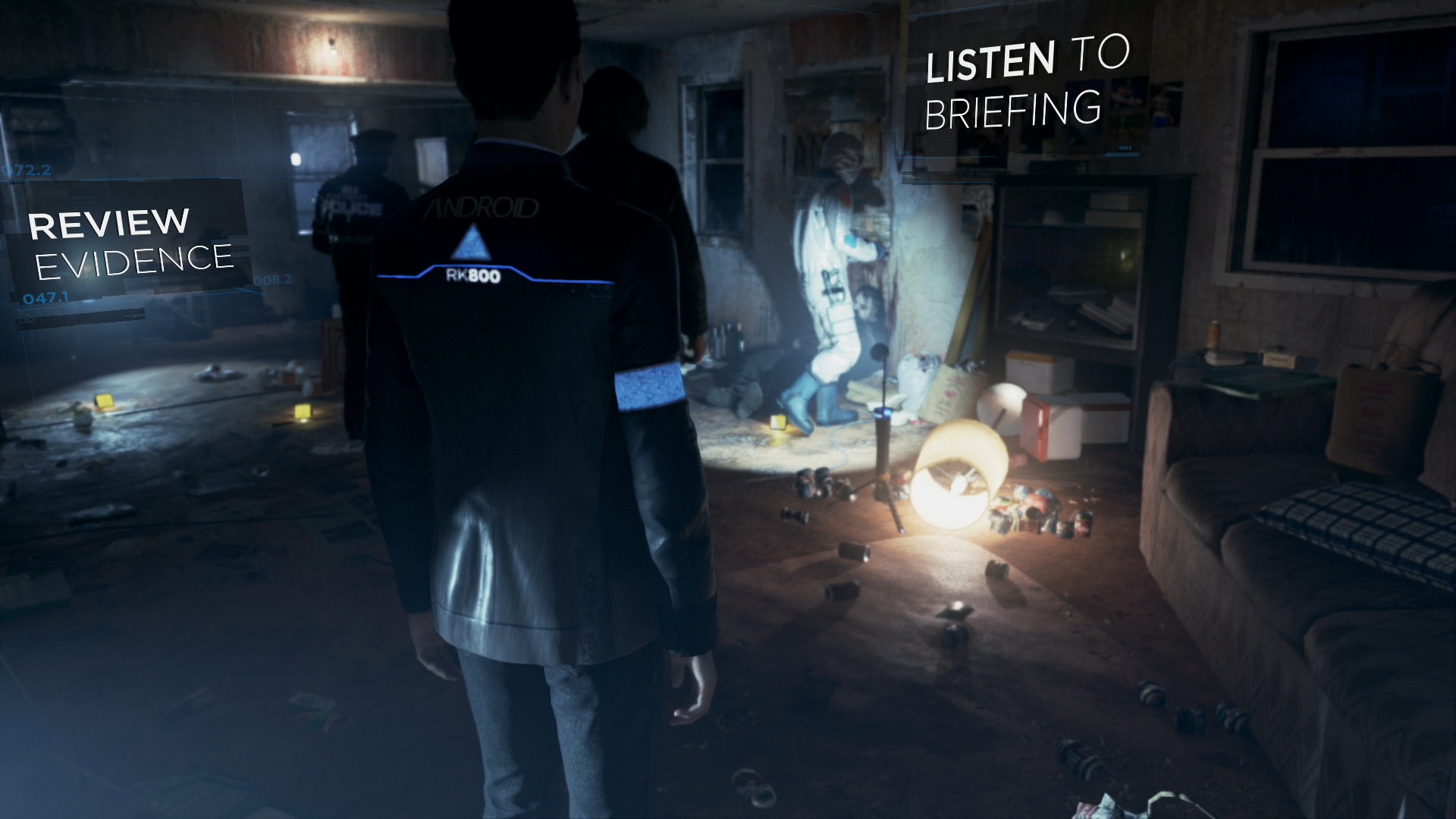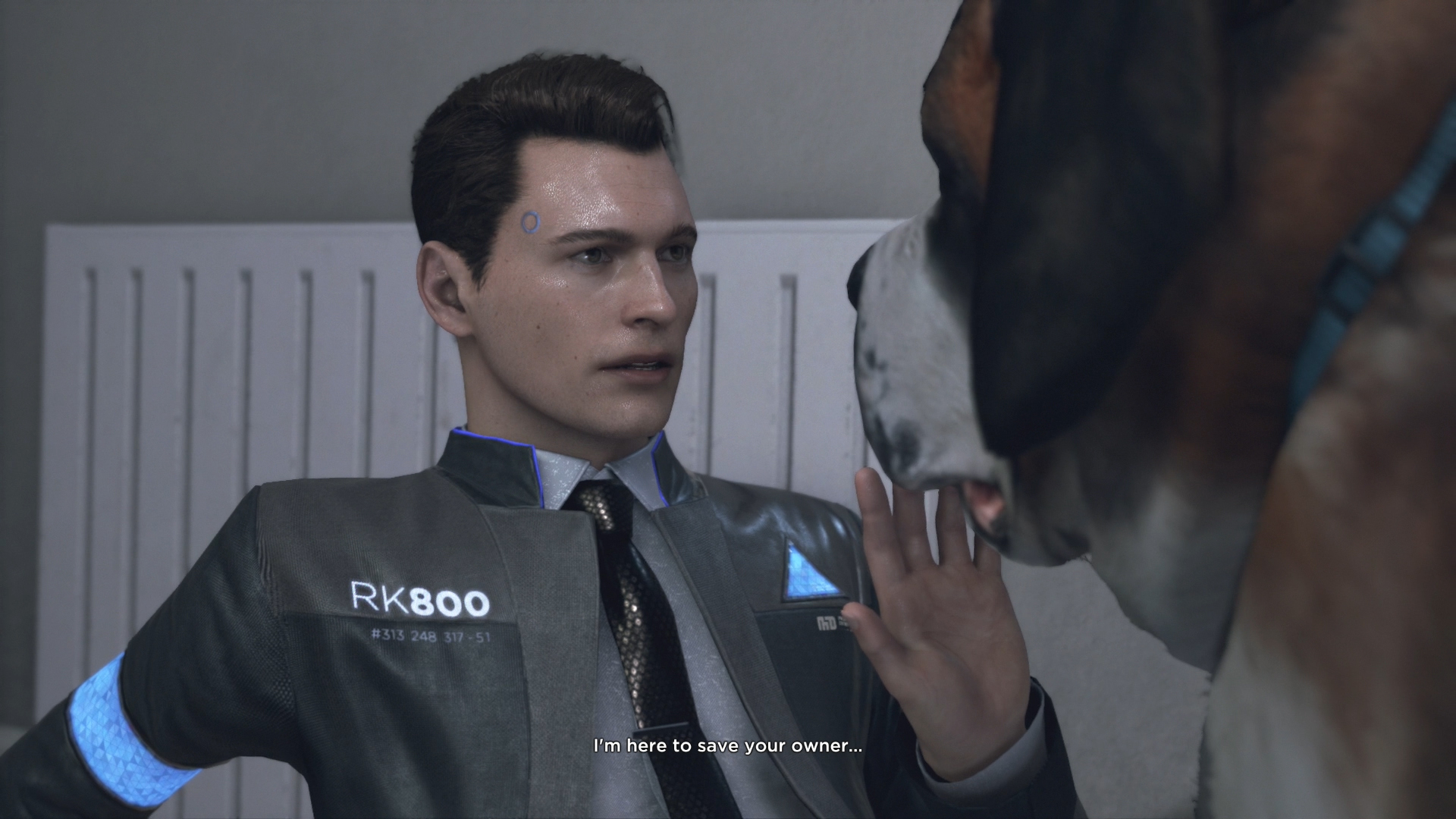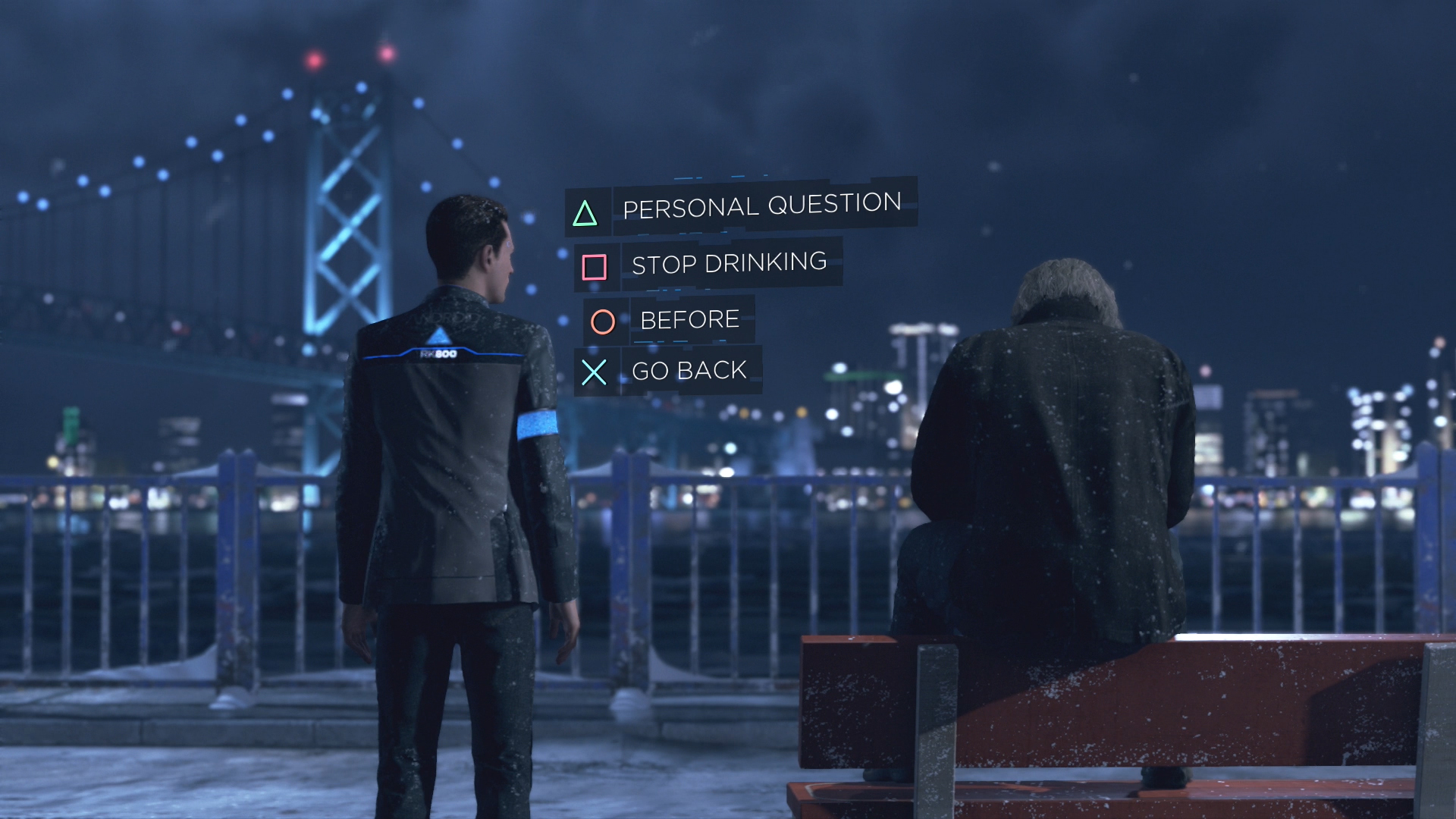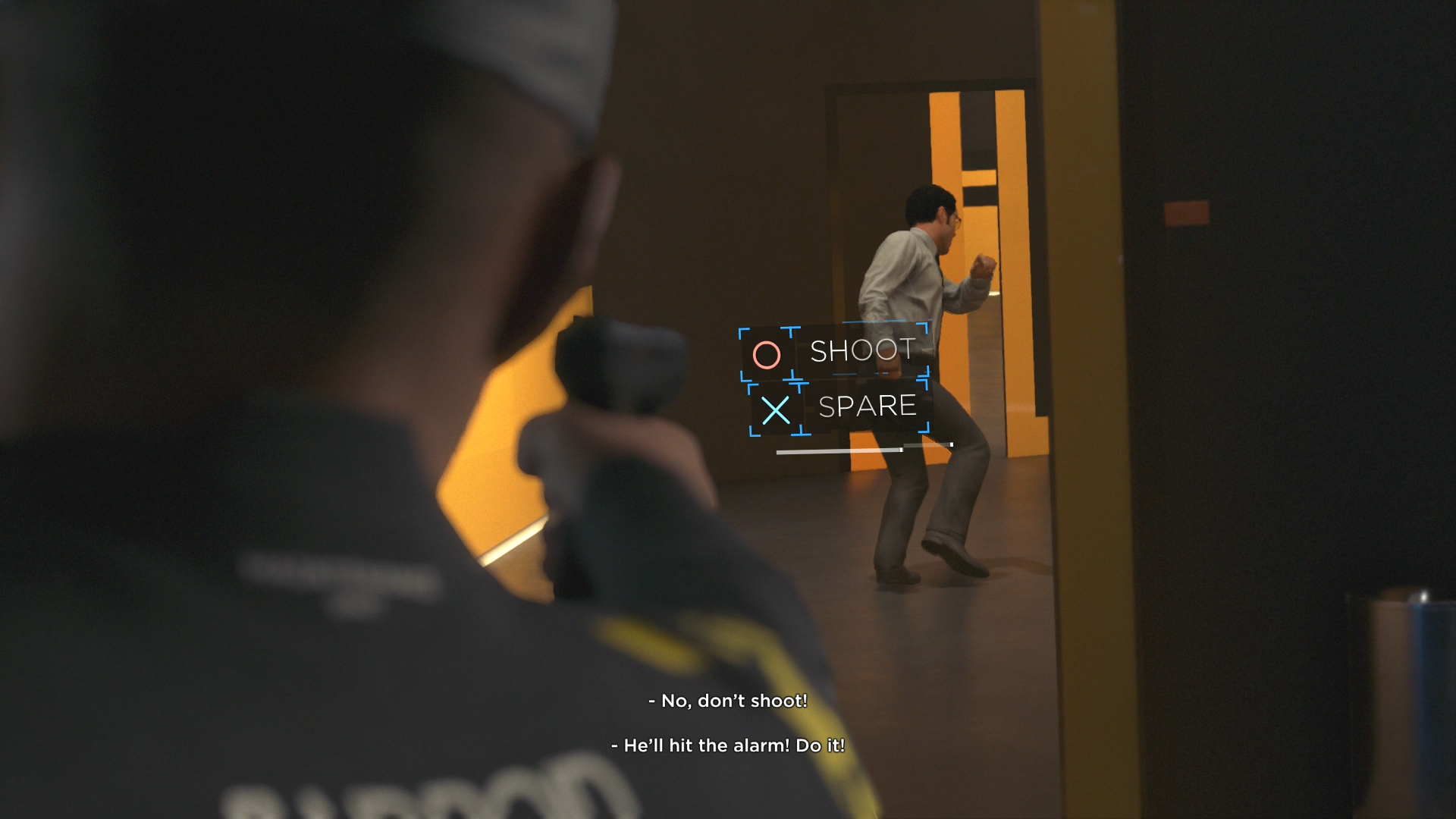
AI has been a hot buzzword these last few years. Looking aside from real-world developments like software-based assistants in your pocket and on your desk, or the stark warnings from those (like Musk and Hawking) who are much smarter than you and me on the complications it could bring – it’s been featured in multimedia concurrently in the last few decades leading up to shows like Westworld. However, the incredibly topical nature of the subject has now culminated in David Cage’s latest creation: Detroit. Love or hate him, Cage has none-the-less produced some standout games over the years which constantly get people talking about the subject matter and what should be considered a “game.” This one is no different – if you’re not a fan of his previous games, then I may as well tell you right now that Detroit is unlikely to change your opinion. Otherwise, read on. Detroit is by no means an epic masterpiece, but it certainly delves into subjects that are worth the conversation and are worthwhile exploring.

Detroit, naturally, is set in the very same Michigan city. It’s the year 2038, and while its heyday could be considered long passed now thanks to the economic boom that was the auto industry in the early 20th century and its subsequent downfall – Detroit: Become Human shows the city as a renewed commercial and industrial hub yet again, but this time instead thanks to massive advances in AI and the human-like androids that now use it. Androids have taken over most menial and laborious jobs – which, in an ideal world, would leave the rest of the now jobless populous to focus on other things like higher education and creative endeavours.
However, this is certainly not an ideal world (being created by David Cage after all) meaning the androids have become quite hated by those in the mid and lower classes who are now suffering because of their unemployment. On top of everything, a select number of androids have become “deviants,” which more or less means they have become self-aware. On opening their eyes for the first time to see what their role in society really is – essentially, slaves – many escape or become violent.

It’s throughout this tempestuous time that the player takes control of three different androids: Kara, Connor and Markus. Their individual stories interweave throughout the entire game – however, I must be very careful from this point onwards in this review lest I spoil anything, as the playing and experiencing of the story is 90% of the gameplay. So, if my explanations seem a bit basic, keep in mind that it’s deliberate as this game certainly isn’t worth playing for many other reasons (more on this in a bit, though).
Kara and Markus take the role of your everyday service model, with Kara looking after the household of a deadbeat dad and his daughter, while Markus is a carer for an elderly, wheelchair-bound famous painter (in the beginning, anyway). Connor is by far the most interesting character to play as he’s an advanced prototype tasked with investigating the deviants along with a reluctant human investigator. While Kara and Markus’s story arcs are limited in the way they can interact with the world, Connor has many more abilities, which means controlling him as the player is a lot more engaging. Not to say that Markus and Kara’s storylines aren’t as gripping, but the extra interaction certainly makes Connor’s chapters more interactive.

When playing as Kara or Markus, R2 will highlight aspects of the environment that can be interacted with. This could be a menial task such as picking up some dishes and washing them to laser-cutting the window of a skyscraper so you can repel to another floor, violently takeover a broadcasting studio and express your desire to the world that you’d like to be free. Playing as Connor, on the other hand, there’s a lot more to do thanks to his advanced, prototype abilities. If you’re at a crime scene, for instance, you can seek out clues in the environment LA Noire style and reconstruct the timeline of events that led to the crime. It’s a nice break from the usual “walk and watch” approach the rest of the game takes, and it would have been nice if the two other characters had more defined gameplay quirks.
There’s a rather large android elephant in the room, and no doubt you’ve been waiting for me to mention it. The controls – oh boy, the controls. While the “interactive movie style” of gameplay is slowly becoming more accepted thanks to Telltale’s games and a barrage of similar indie titles over the last ten years, I know it will still be a point of contention among many of you. Yes, there’s a lot of “push button to do this” and “swipe thumbstick in this direction to do that” – but ultimately, it would be very difficult to craft such a story-driven experience otherwise. This game thrives on the story and the choices you make within (which I’m about to discuss) – and really, I have no idea how they would pull it off if the game didn’t control that way. It’s not an RPG, it’s not a shooter – it doesn’t even involve driving (the vehicles of 2038 are autonomous, after all). Detroit is in its own genre that’s shared by most other Cage games, and this control scheme is simply how it operates.

What did annoy me, however, is the speed at which the characters roam about. It’s usually too slow for my liking, and a button to move around quicker would have been appreciated. Otherwise, I’m impressed that he utilised a few aspects of the PS4 gamepad that are typically forgotten. The touchpad is used quite a bit, mostly for swiping across on tablet magazines (which is fitting, really). Detroit also uses the DualShock’s motion controls – but let me tell you this: having to suddenly pull your controller upwards is not easy with a cat on your lap.
As is the major selling point of Detroit, the story doesn’t go from A to B. It doesn’t even go from P to H. The game is split into many different chapters, with a particular android’s journey emphasised for each. While these always end on a cliffhanger – which I found particularly enthralling since the story arcs aren’t told consecutively, jumping from character to character – the way they play out will be different depending on how you play thanks to a large amount of choice the game gives you. This, for the most part, comes in the form of moral dilemmas. For every choice given, the consequences of your actions will have to be thought out since there are no checkpoints or undos. If a character dies – even a main one, they’re gone for good. Even if the result isn’t as dramatic as death, the relationships you form with other characters will be dictated by your actions which will lead to many different paths.

Detroit has multiple endings with dozens of different ways of getting to them – which is without a doubt, its major positive. Even better, it’s possible to replay individual chapters later on if you’re curious about how things could have played out differently. It took about 14 hours for me to complete my own story arc, but Quantic Dream claims that it could take up to 40 if you were to attempt every path. Detroit’s other major positive is the setting and atmosphere that has been fashioned for us. While there are plenty of interesting things to look at, there’s also an abundance of reading materials (in the form of digital magazines) and news reports to watch that build a realistic setting. To delve into these is, of course, optional, but to ignore them would be a shame as they add so much to the experience.
It should go without saying that the graphics are as marvellous as expected for a PS4 exclusive that’s been in production for five years. Taking full advantage of the hardware, the environments come alive with high amounts of detail and realistic lighting and atmospheric effects. Motion capture, again, is a highlight as Quantic Dream keeps upping their game with every release. The acting is great too, although doesn’t include the high calibre cast that Beyond: Two Souls did. While most actors are famous enough to at least have their own Wikipedia page, the actor you’re most likely to recognise is Clancy Brown who plays the washed-up cop that is unenthusiastically paired with Connor to investigate the deviants. He’s played a million different roles over the years, but I instantly recognised him as Captain Hadley in Shawshank Redemption. You, however, might know him best as the voice of Mr. Krabs.

The best part of Detroit: Become Human is without a doubt the story, so it’s a huge shame I can’t talk about it in detail. If you’re not into story-driven games, then the gameplay certainly won’t engross you enough to make it worthwhile as the narrative is all Detroit really has. However, if you are interested in giving it a go, it’s a fascinating experience as the game explores AI and opens a dialogue about the impact they’ll have in society, their humanity and exactly what rights they should have if they were to become sentient. The story does have its up and downs for sure – there are plenty of tropes, clichés and a bit too much melodrama that stops it short of being a literary masterpiece. It also doesn’t bring any new ideas to the table about AI going rogue – but then again, as a piece of entertainment it does as described – it entertains. While it doesn’t excel as a “game” in the sense of the word, it’s easily one of the best experiences of its kind I’ve played, and I enjoyed it thoroughly.











